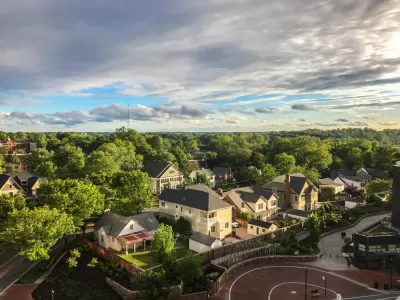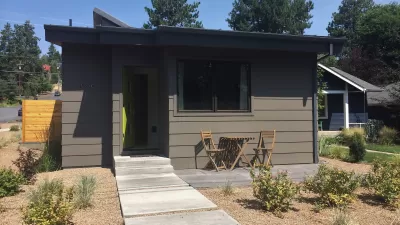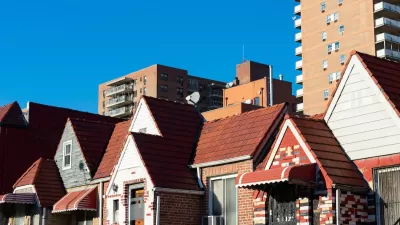The Montgomery County Council is preparing to vote on an amendment that would loosen restrictions on the controversial building type known as accessory dwelling units (ADUs).

One of the country's most famous suburban counties could add a significant amount of building capacity if the Montgomery County Council votes to approve new accessory dwelling unit (ADU) regulations in a vote on July 16.
Ally Schweitzer reports on the controversy surrounding Zoning Text Amendment 19-01, which "would slash some of the red tape that can complicate the process of adding a separate apartment to a single-family lot. It would eliminate a requirement that neighborhoods can only have one ADU every 300 or 500 feet, depending on the zone they’re in. The proposal would also remove a ban on tiny homes and other detached apartments on smaller lots, like those often found in Silver Spring and Bethesda."
Schweitzer starts the article with the story of an ADU owner that believes ADUs could make her part of country much more affordable for "senior citizens, hourly wage-earners and people just entering the workforce."
There are many others in the county, however, who oppose the loosening of ADU regulations on multiple grounds. According to Schweitzer, "opponents of the measure say adding more ADUs could crowd neighborhoods, worsen traffic congestion and exacerbate stormwater drainage issues, all while failing to create more affordable housing options. Others predict they’ll attract too many low-income residents, bringing down property values in the process."
One such resident made that last opinion clear with a letter to the editor of The Washington Post, prompting a reply on Facebook from Montgomery Countil Councilmember Nancy Navarro.
Montgomery County has been making news recently for struggling to adopt the systems and priorities of a more urban-oriented building pattern, approving a building moratorium in response to school overcrowding and also cutting back on bus service in recent weeks.
FULL STORY: A Big Fight Over Small Apartments In Montgomery County

Alabama: Trump Terminates Settlements for Black Communities Harmed By Raw Sewage
Trump deemed the landmark civil rights agreement “illegal DEI and environmental justice policy.”

Planetizen Federal Action Tracker
A weekly monitor of how Trump’s orders and actions are impacting planners and planning in America.

The 120 Year Old Tiny Home Villages That Sheltered San Francisco’s Earthquake Refugees
More than a century ago, San Francisco mobilized to house thousands of residents displaced by the 1906 earthquake. Could their strategy offer a model for the present?

In Both Crashes and Crime, Public Transportation is Far Safer than Driving
Contrary to popular assumptions, public transportation has far lower crash and crime rates than automobile travel. For safer communities, improve and encourage transit travel.

Report: Zoning Reforms Should Complement Nashville’s Ambitious Transit Plan
Without reform, restrictive zoning codes will limit the impact of the city’s planned transit expansion and could exclude some of the residents who depend on transit the most.

Judge Orders Release of Frozen IRA, IIJA Funding
The decision is a victory for environmental groups who charged that freezing funds for critical infrastructure and disaster response programs caused “real and irreparable harm” to communities.
Urban Design for Planners 1: Software Tools
This six-course series explores essential urban design concepts using open source software and equips planners with the tools they need to participate fully in the urban design process.
Planning for Universal Design
Learn the tools for implementing Universal Design in planning regulations.
Clanton & Associates, Inc.
Jessamine County Fiscal Court
Institute for Housing and Urban Development Studies (IHS)
City of Grandview
Harvard GSD Executive Education
Toledo-Lucas County Plan Commissions
Salt Lake City
NYU Wagner Graduate School of Public Service





























